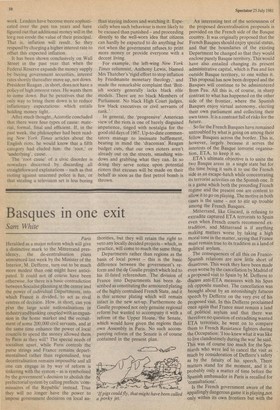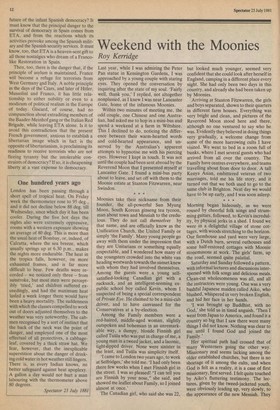Basques in one exit
Sam White
Paris Heralded as a major reform which will give a distinctive mark to the Mitterrand presidency. the de-centralisation plans announced last week by the Minister of the Interior, M. Defferre, turn out to be much more modest than one might have anticipated. It could not of course have been otherwise, for there is a basic contradiction between Socialist planning at the centre and the power of individual Departments, into which France is divided, to act as rival centres of decision. How, in short, can you plan the large scale nationalisations in industryand banking coupled with an expansion in the home market and the recruitment of some 200,000 civil servants, and at the same time enhance the power of local councils to spend the money allowed them by Paris as they will? The special needs of socialism apart. while Paris controls the purse strings and France remains departmentalised rather than regionalised, true decentralisation remains impossible and all one can engage in by way of reform is tinkering with the system — as is symbolised by the government's decision to abolish the prefectorial system by calling prefects 'commissaires of the Republic' instead. True they will no longer have the power to impose government decisions on local au thorities, but they will retain the right to veto any locally decided projects — which, in practice, will come to much the same thing.
Departments rather than regions as the basis of local power — this is the basic difference between the government's reform and the de Gaulle project which led to his ill-fated referendum. The division of France into Departments has been described as constituting the armoured plating of the highly centralised French State, and it is this armour plating which will remain intact in the new set-up. Furthermore de Gaulle proposed not only genuine regional reform but wanted to accompany it with a reform of the Upper House, the Senate, which would have given the regions their own Assembly in Paris. No such accompanying reform of the Senate is of course contained in the present plan. An interesting test of the seriousness of the proposed decentralisation proposals is provided on the French side of the Basque country. It was originally proposed that the French Basques should enjoy special status, and that the boundaries of the existing Department be changed so that they would enclose purely Basque territory. This would have also entailed changing its present administrative capital, which is Pau and lies outside Basque territory, to one within it. This proposal has now been dropped and the Basques will continue to be administered from Pau. All this is, of course, in sharp contrast to what has happened on the other side of the frontier, where the Spanish Basques enjoy virtual autonomy, electing their own parliament and collecting their own taxes. It is a contrast full of risks for the future.
So far the French Basques have remained untroubled by what is going on among their fellow Basques across the border. This is, however, largely because it serves the interests of the Basque terrorist organisation, ETA, to keep it so.
ETA's ultimate objective is to unite the two Basque areas in a single state but for the time being it suits it to use the French side as an escape-hatch while concentrating its terrorist activities on the Spanish one. It is a game which both the preceding French regime and the present one are content to allow it to go on playing. The motive in both cases is the same — not to stir up trouble among the French Basques.
Mitterrand, like Giscard, is refusing to extradite captured ETA terrorists to Spain even when French courts recommend extradition, and Mitterrand is if anything making matters worse by taking a high moral tone in the matter, saying that France must remain true to its tradition as a land of political asylum.
The consequences of all this on FrancoSpanish relations are now little short of disastrous. This week they have been made even worse by the cancellation by Madrid of a proposed visit to Spain by M. Defferre to discuss anti-ETA measures with his Span ish opposite number. The cancellation was brought about by an astonishingly fatuous speech by Defferre on the very eve of his proposed visit. In this Defferre proclaimed once again that France must remain a land of political asylum and that there was therefore no question of extraditing wanted ETA terrorists; he went on to compare them to French Resistance fighters during the Occupation: 'I too knew what it was like to live clandestinely during the war' he said. This was of course too much for the Spaniards who were led to cancel the visit as much by consideration of Defferre's safety as by the fatuity of his speech. There matters stand for the moment, and it is probably only a matter of time before the Spanish ambassador in Paris is recalled for 'consultations'.
Is the French government aware of the appallingly dangerous game it is playing ,not only within its own frontiers but with the future of the infant Spanish democracy? It must know that the principal danger to the survival of democracy in Spain comes from ETA, and from the reactions which its activities provoke among the Spanish military and the Spanish security services. It must know, too, that ETA is a heaven-sent gift to all those nostalgics who dream of a Francolike Restoration in Spain.
Then, too, there is the danger that, if the principle of asylum is maintained, France will become a refuge for terrorists from West Germany and Italy. A noble principle in the days of the Czars, and later of Hitler, Mussolini and Franco, it has little relationship to either nobility or even to a modicum of political realism in the Europe of today. Giscard, of course, had no compunction about extraditing members of the Baader-Meinhof gang or the Italian Red Brigade, while leaving ETA alone. Is it to avoid this contradiction that the present French government, anxious to establish a libertarian image which in fact is the opposite of libertarianism, is proclaiming its readiness to receive terrorists who are not fleeing tyranny but the intolerable constraints of democracy? If so, it is cheapening liberty at a vast expense to democracy.



































 Previous page
Previous page